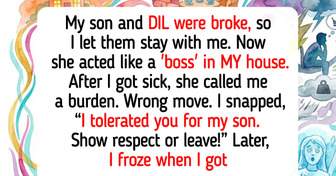Red flag
My Husband’s Therapist Destroyed Our Marriage and Trust

Recently, we received an emotional story from one of our readers, who shared how her life turned upside down after her husband began visiting a therapist.
After a normal day, Emily’s life changed unexpectedly. Her husband, Mark, had been seeing a therapist for a few months, and she had encouraged him to seek help for his personal issues, believing it would improve their relationship.

As he spoke, Emily began to shift her focus away from Mark’s actions and toward the therapist. She felt anger rising as she thought about how the therapist’s advice might have influenced him.

As they continued to talk, Mark mentioned how he had been encouraged to prioritize his happiness and explore his identity. Emily felt that the therapist had no right to interfere in their marriage and wondered if she had manipulated his thoughts. She became convinced that the therapist was the reason for their unraveling.
Emily thought about how her life had changed. She felt a deep sense of loss, but she also knew she had to figure out her next steps. She began to consider how to reclaim her life and redefine her identity outside of her relationship with Mark.
What to do if one spouse wants a divorce.
To avoid divorce, you must show that you can change. Reflect on what led to this point: what has your spouse been complaining about? What have you not addressed? Identify the behaviors you’re willing to change to improve your marriage.
While it may feel unfair, if your spouse is at their limit, and you want to save the relationship, you may need to initiate real change. Here are steps to help repair the rift:
- Act Confidently: Move forward with confidence, regardless of your spouse's decision.
- Listen and Communicate: Allow your spouse to voice their concerns. Show that you want to save the marriage and listen actively.
- Be Your Best Self: Stay positive and composed; avoid anger or revenge.
- Show Respect: Treat your spouse with respect, and practice self-respect as well.
- Avoid Arguments: Don’t engage in fights. If conflicts arise, suggest a civil conversation instead.
- Seek Help: Consider reading self-help books or seeing a marriage counselor.
- Give Space: Don’t pry into your spouse’s whereabouts. Allow them room to breathe.
- Stay Active: Continue your daily life and activities. Spend time with friends and family, and pursue new hobbies.
- Maintain Appearance: Take care of your hygiene and appearance to support your mental health.
- Show Contentment: Let your spouse see you finding joy outside the relationship. Use therapy or counseling as a safe space to process your feelings.
What not to do if one spouse wants a divorce.
To save your marriage, avoid actions that can sabotage your efforts, especially when feeling hurt or hopeless. Here are key behaviors to steer clear of:
- Acting Out: Engaging in bad habits, or flirting with others won’t help your situation.
- Begging: Pressuring or pleading with your spouse can drive them away.
- Buying Gifts: Trying to resolve issues with gifts won’t fix the underlying problems.
- Gossiping: Involving friends or family can worsen the situation and upset your spouse.
- Idealizing: Avoid only highlighting the positive aspects of your marriage or yourself.
- Manipulating: Statements like “I love you” or suggesting books about relationships can seem pushy.
- Nagging: Excessive calls or texts can come off as desperate.
- Neediness: While it’s normal to feel sad, try not to act overly needy.
- Reminiscing: Avoid bringing up past memories or looking at old photos together.
- Spying: Checking your spouse’s messages or following them can damage trust.
Comments
Related Reads
12 People Whose Hobbies Defy All Expectations

17 People Revealed What Became the Last Straw in Their Relationship

My Vegan Meal Offended My MIL—Then Her Payback Was Brutal

This Is the Reason Catherine, Princess of Wales, Was Alone in Her Cancer Announcement Video

20 Weird Things That Can Make You Cringe as Soon as You See Them

Keanu Reeves Finally Cuts His Long Hair, and His New Look Causes a Stir

10 Moments That Prove Kindness Still Wins in an Unfair World

16 Families Whose Everyday Life Is Basically a Sitcom

14 Stories That Prove Kindness Is the Most Powerful Force on Earth

I Refused to Let My DIL Walk All Over Me in My Own House—Then She Went Too Far

My Daughter Disrespected My Sacrifices—And I Refused to Let It Slide

20 Moments When Quiet Kindness Turned Regular Humans Into Heroes


